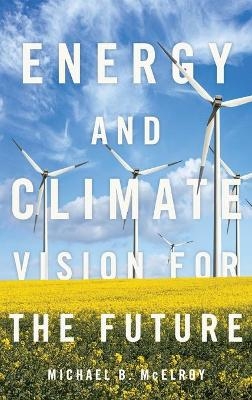
Energy and Climate
Oxford University Press Inc (Verlag)
978-0-19-049033-1 (ISBN)
The climate of our planet is changing at a rate unprecedented in recent human history. The energy absorbed from the sun exceeds what is returned to space. The planet as a whole is gaining energy. The heat content of the ocean is increasing, the surface and atmosphere are warming, mid-latitude glaciers are melting, sea level is rising, and the Arctic Ocean is losing its ice cover. None of these assertions is based on theory but on hard observational facts.
Given the science-heavy nature of climate change, debates and discussions have not played as big a role in the public sphere as they should, and instead are relegated to often misinformed political discussions and inaccessible scientific conferences. Michael B. McElroy, an eminent Harvard scholar of environmental studies, combines both his research chops and pedagogical expertise to present a book that will appeal to the lay reader but still be grounded in scientific fact.
The book begins with a general introduction, followed by chapters on energy basics, a discussion of the contemporary energy systems of the US and China, and the aforementioned chapters on climate. It continues with a series of chapters on specific energy options: coal, oil, natural gas, nuclear, wind, solar, hydro, geothermal, and biomass. The perspective is global but with a specific focus on the US and China recognizing the critical role these countries must play in addressing the challenge of global climate change. The book concludes with a discussion of initiatives now underway to at least reduce the rate of increase of greenhouse gas emissions, together with a vision for a low carbon energy future that could in principle minimize the long-term impact of energy systems on global climate.
Michael B. McElroy is the Gilbert Butler Professor of Environmental Studies at Harvard University.
Chapter 1 Introduction
Chapter 2 Energy Basics
Chapter 3 The contemporary US energy system: overview including a comparison with China
Chapter 4 Human induced climate change: why you should take it seriously
Chapter 5 Human induced climate change: arguments offered by those who dissent
Chapter 6 Coal: abundant but problematic
Chapter 7 Oil: a volatile past, an uncertain future
Chapter 8 Natural gas: least polluting of the fossil fuels
Chapter 9 Nuclear power: an optimistic beginning, a clouded future
Chapter 10. Power from wind: opportunities and challenges
Chapter 11. Power from the sun: abundant but expensive
Chapter 12. Hydro: power from running water
Chapter 13. Earth heat and lunar gravity: geothermal and tidal energy
Chapter 14. Plant biomass as a substitute for oil in transportation
Chapter 15. Limiting US and Chinese emissions: the Beijing agreement
Chapter 16. Vision for a low carbon energy future
| Erscheinungsdatum | 15.08.2016 |
|---|---|
| Zusatzinfo | 80 |
| Verlagsort | New York |
| Sprache | englisch |
| Maße | 239 x 157 mm |
| Gewicht | 544 g |
| Themenwelt | Naturwissenschaften ► Biologie ► Ökologie / Naturschutz |
| Naturwissenschaften ► Geowissenschaften ► Geologie | |
| Naturwissenschaften ► Geowissenschaften ► Geophysik | |
| Sozialwissenschaften ► Politik / Verwaltung ► Europäische / Internationale Politik | |
| Technik ► Elektrotechnik / Energietechnik | |
| ISBN-10 | 0-19-049033-0 / 0190490330 |
| ISBN-13 | 978-0-19-049033-1 / 9780190490331 |
| Zustand | Neuware |
| Informationen gemäß Produktsicherheitsverordnung (GPSR) | |
| Haben Sie eine Frage zum Produkt? |
aus dem Bereich


